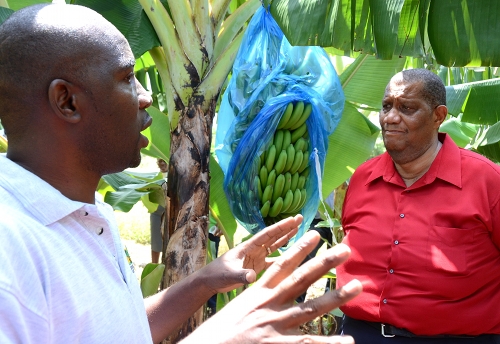Above: Agriculture Minister Roger Clarke listens to Oral Lewis, head of extension services for Jamaica’s Banana Board (JIS Photo)
By the Caribbean Journal staff
Jamaica’s banana sector, which has been under threat from detrimental trade rulings to the crippling Black Sigatoka disease, is getting help from a Honduras-sourced banana variety.
Local farmers will soon introduce the Honduras Foundation for Agricultural Research variety, which is reportedly more resistant to Black Sigatoka and has a lower cost of production.
The variety, which was developed by Dr Phil Rowe in Honduras, is seen as potentially creating a sustainable value-added market within three years, according to the European Union.
The Black Sigatoka has been ravaging bananas in the region, particularly St Lucia, which has looked to another Central American country, Costa Rica, for assistance.
Bananas are one of the most popular fruits in Jamaica; according to Agriculture Ministry data, 98 percent of Jamaicans eat them regularly.
Approximately 200,000 Jamaican farmers cultivate bananas, and the government envisions production levels of 120,000 tonnes by the year 2020.
“Produce will be increasingly available to supply the growing local banana chips market, as well as for exports of not only chips, but flour and other in-demand transformed products, such as juice extracts,” said Agriculture Minister Roger Clarke.
Another Caribbean country, the Bahamas, has also been looking to such “transformed products.”
Last month, the Bahamas Agricultural and Industrial Corporation concluded a month-long course on the subject, led by Donna Marie Bromfield, secretary of the Jamaica Agro Processors Association.
